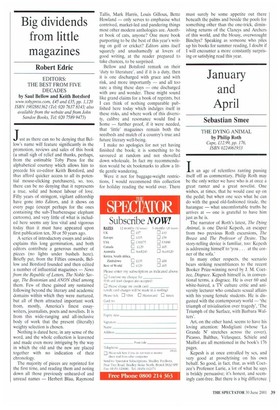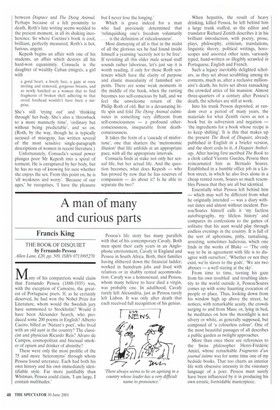January and April
Sebastian Smee
THE DYING ANIMAL by Philip Roth Cape, L12.99, pp. 176, ISBN 0224061933 In an age of relentless ranting passing itself off as commentary, Philip Roth may be the only writer we have who is at once a great ranter and a great novelist. One wishes, at times, that he would ease up on the pedal; but when one sees what he can do with the good old-fashioned tirade, the harangue — what uncomfortable truths he arrives at — one is grateful to have him just as he is.
The narrator of Roth's latest, The Dying Animal, is one David Kepesh, an escaper from two previous Roth excursions, The Breast and The Professor of Desire. The story-telling device is familiar, too: Kepesh is addressing himself to 'you ... at the corner of the sofa.'
In many other respects, the scenario bears striking resemblances to the recent Booker Prize-winning novel by J. M. Coetzee, Disgrace. Kepesh himself is, in conventional terms, a disgrace. He is over 60 and white-haired, a TV culture critic and university lecturer who conducts sexual affairs with his young female students. He is disgusted with the contemporary world — 'the triumph of trivialisation over tragedy', The Triumph of the Surface, with Barbara Walters'.
Art, on the other hand, seems to have his loving attention: Modigliani (whose 'La Grande N' stretches across the cover), Picasso, Balthus, Velasquez, Schiele and Maillol are all mentioned in the book's 176 pages.
Kepesh is at once entralled by sex, and very good at proselytising on his own behalf. So good, in fact, that, as with Coetzee's Professor Lurie, a lot of what he says is briskly persuasive; it's honest, and seemingly cant-free. But there is a big difference between Disgrace and The Dying Animal. Perhaps because of a felt proximity to death, Roth's late writing seems wedded to the present moment, in all its shaking incoherence. So where Coetzee's book is cool, brilliant, perfectly measured, Roth's is hot, furious, urgent.
Kepesh begins an affair with one of his students, an affair which destoys all his hard-won equanimity. Consuela is the daughter of wealthy Cuban emigres, a girl with
a good heart, a lovely face, a gaze at once inviting and removed, gorgeous breasts, and so newly hatched as a woman that to find fragments of broken shell adhering to that ovoid forehead wouldn't have been a surprise.
She's still 'trying out' and 'thinking through' her body. She's also a 'throwback to a more mannerly time', 'ordinary but without being predictable', and so on. (Roth, by the way, though he is typically accused of misogyny, has written several of the most sensitive single-paragraph descriptions of women in recent literature.) Unfortunately, Consuela's sexual power plunges poor Mr Kepesh into a spiral of torment. He is enraptured by her body, but he has no way of knowing for sure whether she enjoys the sex. From this point on, he is `all weakness and worry'. 'Because of our ages,' he recognises, 'I have the pleasure but I never lose the longing.'
Which is grave indeed for a man who had previously determined that 'relinquishing one's freedom voluntarily . is the definition of ridiculousness'.
Most dismaying of all is that in the midst of all the glorious sex he had found inside himself a yearning 'secretly not to be free'. If revisiting all this older male sexual stuff sounds rather laborious, let's just say it is worth reading, if only for those Roth sentences which have the clarity of purpose and elastic muscularity of famished serpents. There are some weak moments in the middle of the book, when the ranting becomes too self-conscious by half, and we feel the unwelcome return of the Philip Roth of old. But in a devastating little spin and fold The Dying Animal culminates in something very different from self-consciousness — a profound otherconsciousness, inseparable from deathconsciousness.
It takes the form of a 'cascade of misfortune', one that shatters the 'metronomic illusion' that life unfolds at an appropriate pace, with all the appropriate intervals.
Consuela finds at stake not only her sexual life, but her actual life. And the question becomes, what does Kepesh — who has proved by now that he has reserves of compassion — do about it? Is he able to separate the two?











































































 Previous page
Previous page